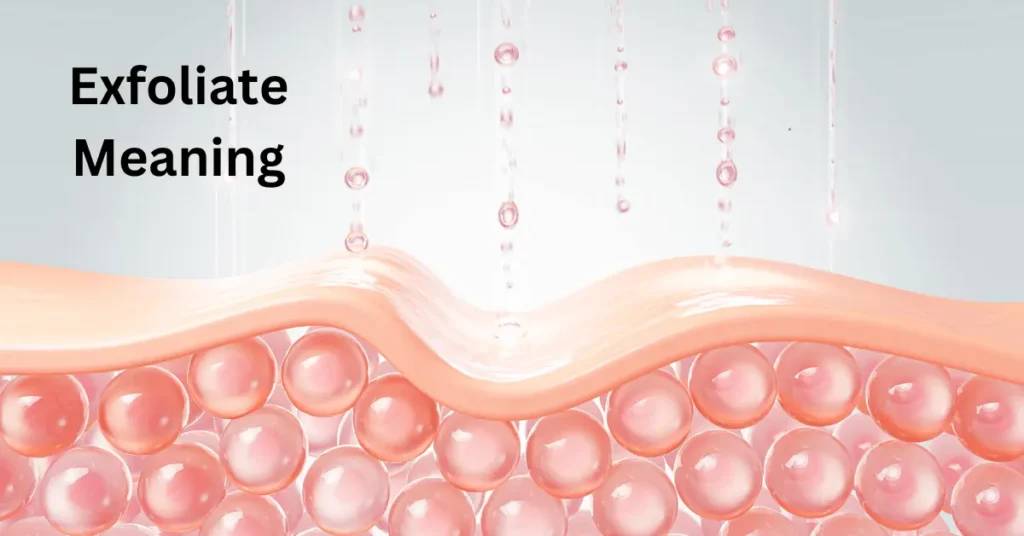Exfoliate Meaning

When it comes to skincare, you’ve probably heard the exfoliate meaning thrown around quite a bit. But what does exfoliate mean exactly?
Simply put, exfoliation is the process of removing dead skin cells from the surface of your skin. It’s an important step in any skincare routine because it helps your skin look brighter, smoother, and healthier.
In this post, we’ll dive into what exfoliate meaning is, how it works, and why it’s so beneficial for your skin.
Whether you’re new to exfoliating or just looking to learn more, we’ve got you covered.
What Does Exfoliate Mean?
To put it simply, “exfoliate” means to remove dead skin cells from the outer layer of your skin. Your skin is constantly renewing itself, and as new skin cells are created underneath, the old, dead skin cells rise to the surface.
These dead cells can build up, leaving your skin looking dull, rough, or uneven. Exfoliating helps slough off this buildup, allowing fresh, new skin to emerge, which gives your complexion a more radiant, smoother appearance.
Exfoliation can be done in two main ways: physical exfoliation and chemical exfoliation.
Physical Exfoliation involves using a tool or a scrub that manually buffs away the dead skin cells.
Think of facial scrubs with tiny beads, brushes, or sponges.
These are often gentle on the skin, but you need to be cautious not to scrub too harshly, as it can irritate sensitive skin.
Chemical Exfoliation uses acids (like alpha-hydroxy acids or beta-hydroxy acids) or enzymes to break down the bonds between dead skin cells.
These acids gently dissolve the outer layer of skin, promoting cell turnover and leaving your skin smooth and glowing. Chemical exfoliants can be gentler than physical exfoliants and can penetrate deeper into the skin.
Regular exfoliation is key to maintaining healthy, glowing skin. It helps clear clogged pores, reduces acne, evens out skin tone, and can even diminish the appearance of fine lines and wrinkles over time.
However, exfoliating too often or with harsh products can strip the skin, leading to irritation or sensitivity, so it’s important to find a routine that works best for your skin type.
Definition of Exfoliate Meaning
To exfoliate means to remove dead skin cells from the outermost layer of the skin, allowing fresh, new skin to emerge.
This process is essential for maintaining healthy and vibrant skin, as it helps to clear away the buildup of dead cells that can lead to clogged pores, dullness, and uneven skin texture.
Exfoliation encourages skin renewal, making your skin appear smoother, brighter, and more radiant.
Exfoliating can be done through different methods, including manual (physical) exfoliation and chemical exfoliation.
Both methods work to slough off the dead skin cells, but they do so in different ways. Regular exfoliation is an important step in many skincare routines, as it helps to keep skin clean, clear, and looking youthful.
Examples of Exfoliate Meaning
Physical (Manual) Exfoliation
- Facial Scrubs: A facial scrub, like a sugar or salt-based product, is one of the most common ways to exfoliate manually. When you apply it to your skin and massage it in circular motions, the gritty texture helps to slough off dead skin cells.
- Exfoliating Brushes or Sponges: Tools like facial brushes or sponges are designed to gently buff away dead skin. They can help improve blood circulation and smooth out rough patches of skin.
- Example: “I use a gentle sugar scrub to exfoliate my face twice a week, and it leaves my skin feeling soft and refreshed.”
Chemical Exfoliation
- Alpha Hydroxy Acids (AHAs): These water-soluble acids are commonly found in exfoliating lotions, toners, and masks. AHAs, like glycolic acid or lactic acid, dissolve the bonds between dead skin cells, allowing them to be removed more easily.
- Beta Hydroxy Acids (BHAs): BHAs, such as salicylic acid, are oil-soluble and can penetrate deeper into pores. They are particularly effective for those with oily or acne-prone skin.
- Enzyme Exfoliants: These exfoliants use natural fruit enzymes, such as papaya or pineapple, to gently dissolve dead skin cells. They’re a good option for those with sensitive skin.
Example: “I use a glycolic acid serum at night to chemically exfoliate my skin, which helps keep my complexion bright and clear.”
Exfoliating helps your skin in many ways: it can improve skin texture, clear up acne, minimize the appearance of pores, and even help your skincare products absorb more effectively.
Whether you choose physical or chemical exfoliation, the goal is the same: to keep your skin fresh, glowing, and free from buildup.
Word Origin of Exfoliate

The word “exfoliate” comes from the Latin word “exfoliare,” which means “to strip off leaves” or “to peel off.” This Latin term is a combination of two parts:
“Ex-“: A prefix meaning “out of” or “away from.”
“Folia”: A Latin word meaning “leaves,” which is related to “folium,” the Latin word for “leaf.”
In its earliest usage, exfoliare referred to the shedding or peeling of leaves from plants or trees. Over time, this idea of shedding or peeling was applied to the outer layer of skin, particularly when discussing the removal of dead skin cells.
The word exfoliate first appeared in English in the 17th century. It was initially used to describe the process of peeling or flaking off layers of something, like the skin or even the outer layers of certain materials.
By the 18th century, the term began to be widely adopted in the context of skincare, referring specifically to the act of removing dead skin cells to promote healthier skin.
Thus, the evolution of exfoliate shifted from its botanical roots (involving leaves) to a more general meaning that now encompasses the shedding of skin cells from the surface of the skin.
This origin ties back to the concept of shedding or peeling away something that no longer serves its purpose, much like leaves falling from a tree in autumn, which makes sense in the context of skincare!
FAQs
How often should I exfoliate my skin?
The frequency of exfoliation depends on your skin type and the exfoliant you’re using. For most people, exfoliating 1 to 3 times a week is sufficient. If you have sensitive skin, you might want to exfoliate just once a week or opt for a gentler exfoliant. Over-exfoliating can lead to irritation and dryness, so it’s important to find a balance that works for your skin.
Can exfoliation help with acne?
Yes, exfoliating can help with acne! Regular exfoliation helps to clear dead skin cells and unclog pores, reducing the chances of breakouts. If you have acne-prone skin, chemical exfoliants like salicylic acid (a BHA) can be especially beneficial, as they penetrate the pores and help clear out oil and debris. However, be careful not to over-exfoliate, as it can irritate the skin and make acne worse.
Is exfoliation good for sensitive skin?
Exfoliation can be good for sensitive skin, but it’s important to choose the right exfoliant. Gentle, mild exfoliants like lactic acid (an AHA) or enzymatic exfoliants (such as papaya or pineapple enzymes) are great options for sensitive skin. Avoid harsh physical exfoliants with rough particles that can cause microtears in the skin. It’s also important to exfoliate less frequently—once a week or every other week—if you have sensitive skin.
Should I exfoliate before or after cleansing?
It’s generally best to cleanse your skin first, as this removes any makeup, dirt, and oils that could block your exfoliant from working effectively. After cleansing, your skin will be clean and prepped to absorb the exfoliant, making it more effective at removing dead skin cells.
Can I exfoliate my skin every day?
While exfoliating every day might sound appealing for smooth skin, it’s usually not recommended for most people. Over-exfoliating can lead to dryness, irritation, or even damage to the skin barrier. Instead, stick to a routine that includes exfoliating just a few times a week, depending on your skin type. If you feel the need to exfoliate daily, opt for a very gentle exfoliant and monitor your skin for any signs of irritation.
Conclusion
Exfoliating is a simple but important step in your skincare routine that helps keep your skin smooth, fresh, and glowing.
By removing dead skin cells, exfoliation helps prevent clogged pores, promotes cell turnover, and enhances your skin’s texture.
Whether you choose physical or chemical exfoliants, the key is to find a method that works best for your skin type and to avoid overdoing it.
With the right approach, exfoliating can make a big difference in the health and appearance of your skin!
Extra Points on Exfoliation
- Always Moisturize After Exfoliating: After you exfoliate, your skin might feel a bit dry or sensitive, so it’s important to apply a good moisturizer. This helps to lock in hydration and keep your skin soft and smooth.
- Use Sunscreen: Exfoliating can make your skin more sensitive to the sun. To protect your skin from UV damage, always wear sunscreen during the day, especially after exfoliating.
- Don’t Over-Exfoliate: More isn’t always better. Exfoliating too often can irritate your skin and make it more prone to redness or sensitivity. Stick to a regular schedule that works for your skin.
- Choose the Right Exfoliant for Your Skin Type: If you have dry or sensitive skin, look for gentle exfoliants like creams or enzyme-based products. Oily or acne-prone skin types can benefit from exfoliants with salicylic acid or other stronger ingredients.
- Listen to Your Skin: Pay attention to how your skin responds after exfoliating. If you notice irritation or dryness, try cutting back on how often you exfoliate or switch to a milder product.